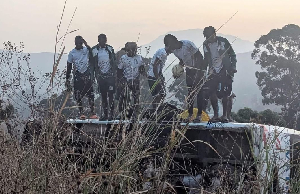The educational infrastructure of the Nyong and Mfoumou Division in the Centre Region of Cameroon has been enriched by 11 more classrooms, built by the Local Materials Promotion Authority, MIPROMALO.
The 11 classrooms, evaluated at over FCFA 93.5 million and built using dominantly local materials, are distributed thus: two classrooms for nursery school Mve, two for SAR-SM Akonolinga Centre, three for Loum Practising School and four for GSS Kpwamendjing.
Talking to the press in Akonolinga, headquarters of Nyong and Mfoumou Division on December 17, after visits to the newly constructed classrooms, the Minister of Public Works, MINTP, Patrice Amba Salla, said the building of the classrooms falls within the framework of a partnership agreement between MIPROMALO and the MINTP signed in 2008 and revisited on September 27, 2010.
According to the terms of the agreement, the two structures collaborate in the domain of training, organisation of activities linked to local materials, all operational cooperation at the central and decentralised services of MINTP or in all domains concerning the two parties.
The Minister stated that, so far, four sample classrooms have been built in the Menoua Division, West Region, with GSS Litieu and GSS Djeu in Fongo Tongo benefitting from two each. GHS Nkor and CETIC Mah all in Bui Division of the Northwest Region have received two classrooms each within the framework of the agreement.
Amba Salla said, in terms of quality of the classrooms constructed by MIPROMALO, there is nothing to regret about. He noted that the buildings of the classrooms using local materials that go along with training of indigenes, could serve as a source of self employment. Calling on the youth to take advantage of the opportunity, he urged councils to support the initiative in their localities.
“The building of the sample classrooms will continue in 2015 in the Lekie Division of the Centre Region. It is Government policy to build schools using local materials and those to be involved in the exercise are those being trained now. From the sample classrooms, the people could be motivated to construct decent private homes at relatively lower costs using the local materials,” the Minister stated.
The Government of Cameroon is taking the use of local materials in the construction of public buildings more seriously, considering that the Prime Minister, on November 12, 2014, signed an arête sanctioning the creation, organisation and functioning of a pilot and follow-up committee with the task of enforcing the 2007 circular on the use of local materials.
On how ready MIPROMALO is to provide the needed services as well as the supply of local materials for construction considering that demand will increase following the recent Prime Ministerial arête, the Director of MIPROMALO, Prof. Uphie Chinje Melo said, over the years, they have been taking measures in that direction.
She said apart from the training and recruitment of more technicians at the MIPROMALO headquarters in Yaounde, many others have also been sent to their various centres in some Regions of the country. They are ready to assist all the stakeholders in need of local materials, she told the press.
“In collaboration with the Ministry of Territorial Administration and Decentralisation, MINATD, MIPROMALO trained some council technicians on the fabrication of local materials for construction. Seventy presses for fabrication of compressed earth bricks were acquired by MINATD and distributed to the trainees and these technicians are capable of also providing the local materials,” Prof. Chinje remarked.
According to her, local producers of equipment for fabrication of local materials are at work while importers have been informed of the latest Prime Ministerial arête.
In addition to the pedagogic documents elaborated by the institution and the revamping of the professional training centre of MIPROMALO, Prof. Chinje said controllers of the Ministry of Public Works and FEICOM charged with follow-up and quality control of the construction works using local materials, have been trained.
Actualités Régionales of Sunday, 28 December 2014
Source: The Post Newspaper












